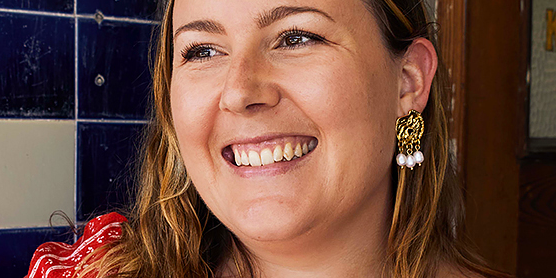How to Move Beyond People-Pleasing

In this guest blog, somatic healer Caroline Birch, one of Comfortable In My Skin’s Recommended Providers, shares her wisdom on people-pleasing and how we can gently return to our authentic selves through the body.
What is people-pleasing?
What comes to mind when you hear the phrase “people-pleasing”?
For some of us, it’s a phrase that’s loaded with shame, self-criticism, resentment or confusion.
For some of us, thinking about people-pleasing evokes thoughts like:
“Why am I like this?”
“What’s wrong with me?”
“Why does setting boundaries feel so impossible for me?”
Or maybe even:
“I like pleasing others. I have no problem with it.”
For others, prioritising others’ needs and comfort over our own is so ingrained as a way of being that it happens habitually, beyond our conscious awareness. This tends to be especially the case for those of us socialised as women, as a result of the cultural messaging we’ve absorbed around what it means to be a “good girl”.
The somatic perspective on people-pleasing
From a somatic perspective, people-pleasing is a nervous system response that happens when it feels safer to please or appease others than it does to do and say what we instinctively sense we want to.
People-pleasing happens when it feels safer in our bodies to neglect our needs, to stay silent when we want to speak up or communicate a limit, or to pretend to agree rather than do, say or choose what feels true for us in that moment.
From a nervous system point of view, people-pleasing is a variation of a “fawn” response.
Every single nervous system response - from fight, to flight, fawn, freeze and collapse - can exist within a body that feels safe and stable, and within a body that does not.
In a body that’s experiencing a felt sense of safety, fawn looks like healthy social engagement and the ability to support others, while not overriding our own needs.
In a body with less access to safety, fawn can look like over-accommodating others’ needs while ignoring our own (or not having a sense of what our own needs actually are).
When we find ourselves in a people-pleasing response, this is an indication that the instinctive capacity for authentic self-expression we were born with is being thwarted by a perceived or actual lack of safety or stability in the body.
People-pleasing can look like:
– Agreeing to stay late in the office when you desperately want to get home to eat dinner or see your family
– Agreeing to intimacy with a partner in a way that doesn’t feel like a yes for you in that moment
– Saying yes to an invitation when it feels like a visceral no in your body
– Expressing the opinion you think others want you to express, over the one that feels true and alive for you
Sometimes, fawning is the safest option
One thing to keep in mind is that our bodies are infinitely wise. Sometimes, the safest option is indeed to fawn or people-please. For example, for many survivors of intimate partner abuse, people-pleasing, doing or saying what was expected of them, was the very thing that kept them alive.
How do we overcome people-pleasing?
What’s essential is that we start by normalising and validating people-pleasing as a natural response to learning to sacrifice authenticity in order to stay safe. Our bodies don’t make mistakes, they learn through experience. For a child, safety = attachment to caregivers.
As Dr Gabor Maté, child development specialist, puts it:
“What happens is if, for the sake of fitting in with the family or with a culture that doesn’t particularly support our authenticity, we have to give up our connection to ourselves, our authenticity, for the sake of attachment? Then being inauthentic, being out of touch with ourselves, is how we survive.”
A somatic approach to moving beyond people-pleasing towards authentic self-expression means that we work with the residue of our past experiences, in the presence of new conditions - witnessing, validation, stability, attunement, dignity, respect, voice and choice.
We give our bodies what they need to move the residue of past experiences and conditioning through the soma (the body), so that our innate, primal instinct for authentic self-expression can come back online.
Cultivating greater stability - the capacity to stay present in the midst of intensity and sense what your body wants to do next - is incredibly supportive of deepening our access to authentic self-expression. So that we can say yes when we mean yes, no when we mean no, without it overthrowing our capacity to stay grounded in the here and now.
When it comes to changing our habits of years, decades or lifetimes, slow and gentle always wins. Our bodies learn new ways of being through repetition, over time, in ways that honour our current sense of stability and capacity.
Counter to what residing in a hustle culture tends to model to us, human bodies love to go slowly. A somatic approach favours slowly and gently showing our bodies that we can have access to both safety and authenticity at the same time.
Caroline Birch is a Somatic Coach, Educator & Retreat Facilitator who guides her clients to get free from the emotional weight of the past, move beyond old patterns & live from a place of stability, self-trust & power. Her nature-led somatic approach centres around gentle digestion of the somatic residue of past experiences & embodying your most instinctive ways of being. Book with her here.
0 comments




